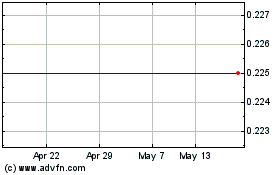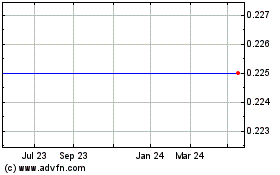African Medical Investments PLC Final Results -4-
August 31 2012 - 2:01AM
UK Regulatory
These financial statements have been presented in US Dollars
because this is the currency of the primary economic environment in
which the Group operates. Foreign operations are included in
accordance with the policies set out in note 2.
The financial statements have been prepared in accordance with
International Financial Reporting Standards ("IFRS") as adopted by
the European Union ("EU").
2. Significant accounting policies
During the year the following standards have been adopted in
these financial statements:
IFRS 1 First-time Adoption of International
Financial Reporting Standards
IFRS 7 Financial Instruments: Disclosures
IAS 1 Presentation of Financial Statements
IAS 24 Related Party Disclosure
IAS 32 Classification of Rights Issues'
IAS 34 Interim Financial Reporting
IFRIC 13 Customer Loyalty Programme
IFRIC 14 (amended) The Limit on a Defined Benefit Asset,
Minimum Funding Requirements and their
Interaction
IFRIC 19 Extinguishing Financial Liabilities
with Equity Instruments
The adoption of these standards has had no material effect
except for minor disclosure items.
At the date of authorisation of these financial statements, the
following Standards and Interpretations relevant to the Group's
operations that have not been applied in these financial statements
were in issue but not yet effective or endorsed (unless otherwise
stated):
IFRS 7 'Financial Instruments: Disclosures'
Disclosures, Transfers of Financial
Assets' (effective for annual periods
beginning on or after 1 July 2011)
- Amendment. The amendments will require
improved disclosures of transfers of
financial assets, including explaining
the possible effects of any risks that
may remain with the entity that transferred
the assets. The amendments also require
additional disclosures if a disproportionate
amount of transfers are undertaken
around the end of a reporting period.*
IFRS 9 'Financial Instruments' (effective
for annual periods beginning on or
after 1 January 2015). The standard
applies a consistent approach to classifying
financial assets and replaces the numerous
categories of financial assets in IAS
39, each of which had its own classification
criteria. It also results in one impairment
method, replacing the numerous impairment
methods in IAS 39 that arise from the
different classification categories.
IFRS 10 'Consolidated Financial Statements'
(effective for annual periods beginning
on or after 1 January 2013). The new
standard will replace IAS 27 'Consolidated
and Separate Financial Statements'
and SIC 12 'Consolidation - Special
Purpose Entities'. IFRS 10 retains
the principle of control, but redefines
control and provides further guidance
on how to apply the control principal.*
IFRS 11 'Joint Arrangements' (effective for
annual periods beginning on or after
1 January 2013). The new standard will
replace IAS 31 'Interests in Joint
Ventures' and SIC 13 'Jointly Controlled
Entities - Non-monetary Contributions
by Venturers' and establishes consistent
principles for financial reporting
for all types of jointly controlled
arrangements. IFRS 11 retains a similar
definition of joint control to IAS
31, but clarifies that a joint arrangement
will be either a 'joint operation'
or a 'joint venture'.*
IFRS 12 'Disclosure of Interests in Other Entities'
(effective for annual periods beginning
on or after 1 January 2013). The new
standard applies to entities that have
interests in subsidiaries, joint arrangements,
associates and other unconsolidated
structured entities and aims to make
disclosures in respect of such entities
consistent.
IFRS 13 'Fair Value Measurement' (effective
for annual periods beginning on or
after 1 January 2013). The new standard
provides guidance on measurement of
fair value for financial reporting
purposes where IFRSs require or permit
fair value measurements or disclosures
about fair value measurements.*
IAS 24 'Related Party Disclosures' (effective
for annual periods beginning on or
after 1 January 2011). The revised
standard simplifies the disclosure
requirements for government-related
entities, requires commitments outstanding
at the reporting date to be disclosed
and clarifies the definition of a related
party.
IFRIC 14 (amended) 'The Limit on a Defined Benefit Asset,
Minimum Funding Requirements and their
Interaction' (effective 1 January 2011)
- Amendment; Prepayments of a Minimum
Funding Requirement. The amendment
permits the benefit of early payment
of contributions paid to cover minimum
funding requirements to be treated
as an asset.
IFRIC 19 'Extinguishing Financial Liabilities
with Equity Instruments' (effective
for annual periods beginning on or
after 1 July 2010). The IFRIC addresses
the accounting for issues of equity
instruments in order to settle, in
full or in part, a financial liability.
Annual improvements
2010.
* Not yet endorsed by the EU.
The directors anticipate that the adoption of these Standards
and Interpretations as appropriate in future periods will have no
material impact on the financial statements of the current
Group.
Basis of accounting
The financial statements have been prepared on the historical
cost basis. The principal accounting policies adopted are set out
below.
Going concern
The board has prepared forecasts based on the latest revised
budgets of the cash generating entities that comprise the on-going
business of the consolidated group.
Revenue forecasts are based on the expected impact of
implementation of the operating plan, including requirements for
working capital demanded by growth in revenue. Business unit
overheads have been projected at a level required to deliver the
operating model. To the extent that capital expenditure is required
and approved, a mix of internal cash flow and external financing is
planned. Allowance has been made for the impact of new facilities
only to the extent that these are certain while a conservative view
has been taken on the expected date of return of the Harare
facility.
The impact on funding requirements of expansionary developments
have not been included in the forecast as each opportunity will be
analysed separately, including funding strategies, by the Board
prior to approval.
These forecasts show cash outflows over the next twelve months.
These outflows are forecast to be met in part by the subscription
for Convertible Loan Notes by Harbinger Capital Partners Master
Fund 1 Ltd (please refer to note 33 Events after the reporting
period for further details), proceeds from sale of AMI Aviation
and, where possible, appropriate external funding in each territory
to meet the needs of the local business unit. Restructure of the
group's various balance sheets is also being considered to create
further external borrowing capacity.
African Med (LSE:AMEI)
Historical Stock Chart
From Apr 2024 to May 2024

African Med (LSE:AMEI)
Historical Stock Chart
From May 2023 to May 2024
